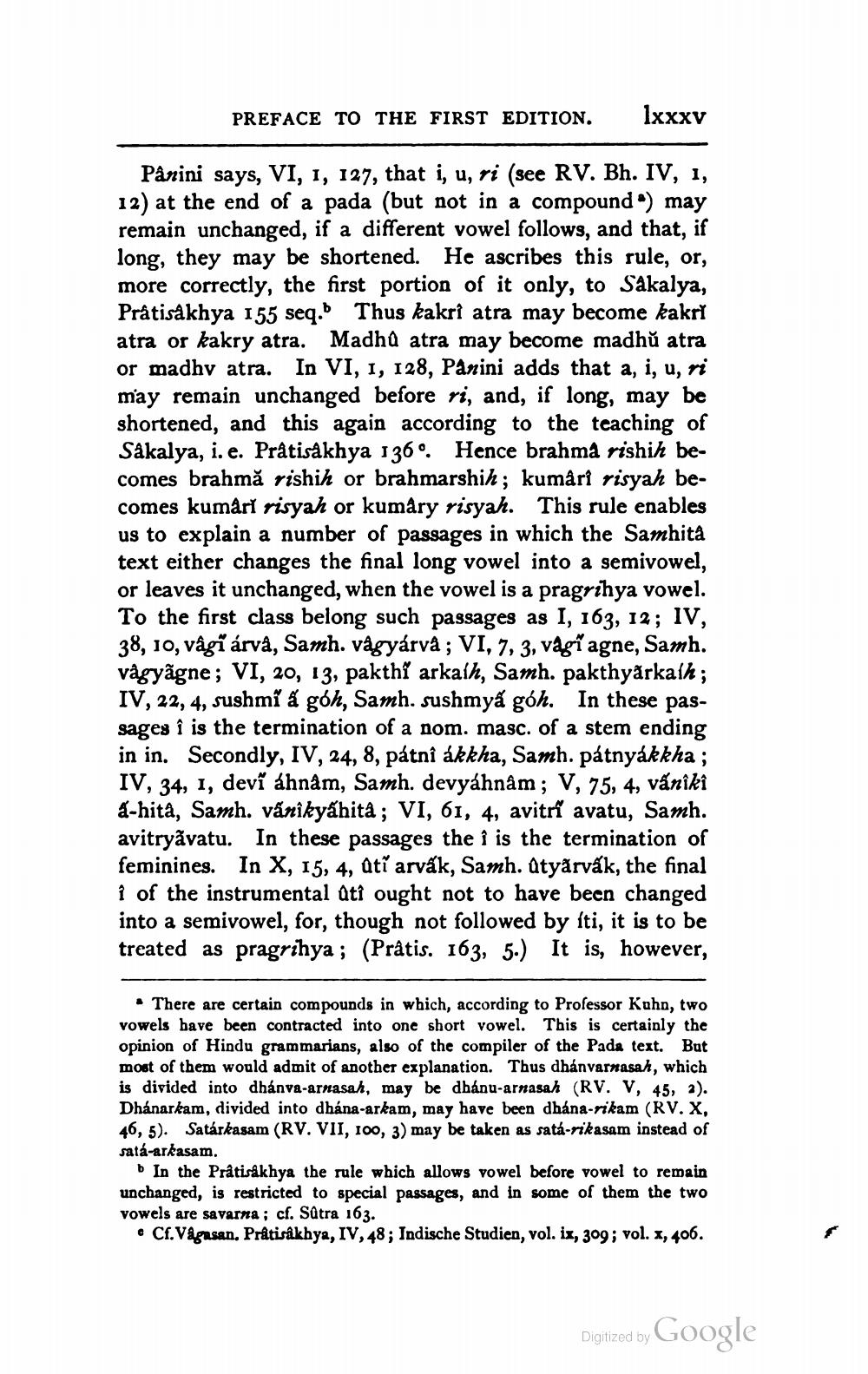________________
PREFACE TO THE FIRST EDITION.
Ixxxy
Panini says, VI, 1, 127, that i, u, ri (see RV. Bh. IV, 1, 12) at the end of a pada (but not in a compound“) may remain unchanged, if a different vowel follows, and that, if long, they may be shortened. He ascribes this rule, or, more correctly, the first portion of it only, to Sakalya, Prátisakhya 155 seq. Thus kakri atra may become kakry atra or kakry atra. Madhu atra may become madhủ atra or madhv atra. In VI, 1, 128, Panini adds that a, i, u, ri may remain unchanged before ri, and, if long, may be shortened, and this again according to the teaching of Såkalya, i.e. Prátisakhya 136o. Hence brahma rishih becomes brahmă rishih or brahmarshih; kumari risyah becomes kumari risyah or kumary risyah. This rule enables us to explain a number of passages in which the Samhita text either changes the final long vowel into a semivowel, or leaves it unchanged, when the vowel is a pragrıhya vowel. To the first class belong such passages as I, 163, 12; IV, 38, 10, vågi árvå, Samh. vágyárvå; VI, 7, 3, vagi agne, Samh. vagyāgne; VI, 20, 13, pakthi arkalh, Samh. pakthyārkash; IV, 22, 4, sushmi á góh, Samh. sushmyá góh. In these passages i is the termination of a nom. masc. of a stem ending in in. Secondly, IV, 24, 8, pátni ákkha, Samh. pátnyákkha; IV, 34, 1, deví áhnàm, Samh. devyáhnâm; V, 75, 4, vânîkî a-hita, Samh. vấnikyáhità; VI, 61, 4, avitrî avatu, Samh. avitryavatu. In these passages the î is the termination of feminines. In X, 15, 4, atř arvák, Samh. Atyárvák, the final î of the instrumental atî ought not to have been changed into a semivowel, for, though not followed by iti, it is to be treated as pragrihya ; (Prátis. 163, 5.) It is, however,
vowels of Hindu granit of another explan ahánu-arnas
• There are certain compounds in which, according to Professor Kuhn, two vowels have been contracted into one short vowel. This is certainly the opinion of Hindu grammarians, also of the compiler of the Pada text. But most of them would admit of another explanation. Thus dhánvarnasah, which is divided into dhánva-arnasah, may be dhanu-arnasah (RV. V, 45, 2). Dhánarkam, divided into dhána-arkam, may have been dhána-rikam (RV.X, 46, 5). Satárkasam (RV. VII, 100, 3) may be taken as satá-rikasam instead of satá arkasam.
In the Prátisakhya the rule which allows vowel before vowel to remain unchanged, is restricted to special passages, and in some of them the two vowels are savarna; cf. Sūtra 163.
. Cf.Vagasan. Prátisåkhya, IV, 48; Indische Studien, vol. ix, 309; vol. 2, 406.
Digitized by Google




